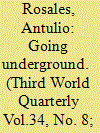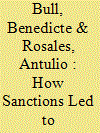| Srl | Item |
| 1 |
ID:
124213


|
|
|
|
|
| Publication |
2013.
|
| Summary/Abstract |
This article argues that South America's 'revolutionary' left turn can be best explained by its assertion of state property over natural resource extraction. The recent history of the leftist movements in Venezuela, Bolivia and Ecuador relates to the failures of the neoliberal reforms applied in the region decades before, hence the dismantling of core orthodox policies has been critical for them once in power. This has been possible through the expansion of state action in the economy, but mainly through the governance of hydrocarbon extraction and the control of subsoil rents. Resource extraction has been central to the political economy of Andean left-wing revolutionaries, responsible for many of their successes but also their impending challenges. This rearticulation of underground governance is linked to global transformations that give prominence to emerging economies and reinforces these countries' position in the world economy as providers of primary commodities.
|
|
|
|
|
|
|
|
|
|
|
|
|
|
|
|
| 2 |
ID:
189701


|
|
|
|
|
| Summary/Abstract |
After a deterioration of democratic conditions in Venezuela, in 2017 the United States intensified its sanctions imposed on the regime of Nicolás Maduro. The sanctions failed to topple the regime, but they accelerated the transformation of the Venezuelan economy. To counter the sanctions, Maduro carried out substantive economic policy changes, resulting in the emergence of a neo-patrimonial and authoritarian form of capitalism. In this new model, private ownership is the rule, and economic agents operate for profit. Yet there is frequent state intervention that denies individuals’ fundamental political and economic rights, and the purpose of laws and regulations is ensuring regime survival.
|
|
|
|
|
|
|
|
|
|
|
|
|
|
|
|
| 3 |
ID:
157554


|
|
|
|
|
| Summary/Abstract |
Nineteenth-century Latin America saw more extensive innovative thought about international political economy than generally recognized. Far from simply imitating British free-trade doctrine, Latin Americans from that era actively modified it to produce distinctive revolutionary, conservative, and developmental rationales for free trade. Opponents of free trade also generated three varieties of Latin American protectionist thought—developmental protectionism, artisan political economy, and autarchic protectionism—that foreshadowed some aspects of post-1945 Latin American structuralist and dependency thought. These various ideational innovations involved both of dominant British free-trade doctrine as well as adaptation of alternative ideas diffusing from elsewhere (a process that we call alternative localization). They reveal new dimensions of the intellectual agency of actors in peripheral regions in the context of the international diffusion of ideas. They also highlight underappreciated diversity within, and overlap between, the historical international political economy (IPE) schools of economic liberalism and economic nationalism. More generally, recognition of these Latin American contributions helps to widen the historical foundations of IPE in ways that are more inclusive of the voices, experiences, knowledge claims, and contributions of those beyond the core powers.
|
|
|
|
|
|
|
|
|
|
|
|
|
|
|
|